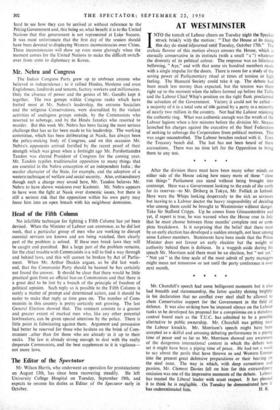Mr. Nehru and Congress
The Indian Congress Party grew up to embrace anyone who believed in independence ; to it rallied Hindus, Moslems and even Englishmen, landlords and tenants, factory workers and millionaires. Only the absence of power and the genius of Mr. Gandhi kept it together. The two groups within Congress ranks which have fretted most at Mr. Nehru's leadership, the extreme Socialists and the religious Conservatives, were discredited by the violent activities of analagous groups outside, by the Communists who resorted to sabotage, and by the Hindu fanatics who resorted to murder. But this week Mr. Nehru has been facing the most serious challenge that has so far been made to his leadership. The working committee, which has been deliberating at Nasik, has always been the policy-making body of Congress, and on this occasion Mr. Nehru's opponents arrived fortified by the recent proof of their strength which was given when a fortnight ago Mr. Purshottamdas Tandon was elected President of Congress for the coming year. Mr. Tandon typifies traditionalist opposition to many things that are essential in the Nehru conception of an independent India ; the secular character of the State, for example, and the adoption of a western technique of welfare and social security. Also, extraordinary though such a charge may sound here, Mr. Tandon believes Mr. Nehru to have shown weakness over Kashmir. Mr. Nehru appears to have won the fight at Nasik over domestic issues, but there is still a serious risk that the opposition within his own party may force him into an open breach with his neighbour dominion.






































 Previous page
Previous page